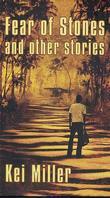

Title: Fear of Stones and other stories
Author: Kei Miller
Publishers: Oxford: Macmillan Education, 2006. 158 pages.
Reviewed by: Mary Hanna
Kei Miller is a poet who tells his stories in the haunting voices of Jamaica's underprivileged. His twelve debut stories offered in Fear of Stones reflect in a lyrical prose the Caribbean experience recorded also in his first book of poems, Kingdom of Empty Bellies. These stories are a fine addition to the Macmillan Caribbean Writers Series (MCW) where they stand proudly beside such contributions as Jan Carew's The Sisters and Manco's Stories, and Anthony Winkler's The Annihilation of Fish and other stories.
Miller writes in an easy, colloquial style and speaks in a range of voices. He tells his stories in brief but vivid episodes, building on a rhythmic accumulation of detail to form an illuminating picture. His protagonists are the small people who are challenged by unfortunate fates: some are gay in a hypocritically macho Kingston world, some have suffered childhood rape, some are mentally backward, and some are involved in obeah, given the absence of hope elsewhere.
Miller's tales are the stories that haven't been told; they call out from the pages to be heard by Caribbean readers and by the wider world.
Tale of a gay youth
The title story, Fear of Stones, is almost a novella in length and complexity. It is the tale of a gay youth who was abandoned by his father, a university lecturer in history, at the time of his mother's death. Fear of Stones speaks to the heart from a variety of human angles, presenting a prism of warm understanding of a strangely lonely boy and explaining the need for community.
It is a gripping story of loss and renewal. Miller has explored his subject with a sympathy that pulls the reader along and lends credibility and tension to the tale: 'And it was still there despite his heaviness, for Gavin was a round child. Round and insecure and completely unaware of his beauty.' Gavin, the lost boy, becomes an adult on the day he finds his father and witnesses his brilliant teaching. There is hope in such revelations.
'Walking on the Tiger Road' is another story that presents a gay protagonist. In this instance, Mary's boy child's return is heralded by the sign of a woodpecker behaving strangely and the boy makes his appearance after being stoned, trying with his last strength to reach his mother. The boy has returned to Jamaica after ten years in the States and tries to pull his way to his mother along the Tiger Road. His is a scapegoat that shows the need for changes in local perception of those who are different.
Story line
'Tolston Closing' is a story of a young woman who finally stands up to her absent Rastafarian husband and cuts the dreadlocks from her children's heads. Tolston has deserted his family after the sixth pregnancy. His wife Naomi finally gives in to the demands of survival and 'normalises' her family. The children are desperate to keep the faith, screaming 'No Mama! Mama no!' but Naomi is determined. 'She cut right through, till they came off in her hands, and she felt free.'
This story is a brave and realistic tale of marriage under stress in the Rastafarian faith. Miller tells it with savvy and aplomb; he brings an understanding to the pressures on a different way of life and how it affects the people involved. Miller has great insight into a wide variety of lifestyles and makes his stories speak clearly of these various life experiences.
'Love in the Time of Fat' is another tale of the ruined life of one who has suffered trauma in her childhood. Jackie's childhood rape had the effect of isolating her and driving her to compulsive overeating. Although she finds a man who shares her love, she cannot free herself of fear sufficiently to overcome the trauma of her childhood experiences and she fails to find healing in her life. Miller brings great understanding to this unfortunate circumstance and writes with verve and terror. It is a memorable and poignant tale that will long be remembered.
There is obeah, superstition and communion with the dead, with love blooming in the most unexpected places. And for all the hardship there is laughter, as in Augustus Silvera's triumphant last letter to the editor and the gospel according to Sue, who repairs her virginity every Sunday morning and so becomes immaculately pregnant. Miller is able to draw the reader in to hear the voices of each of his speakers. This haunting collection of stories presents the rejects of society as people who can be understood and cared for. In future collections Miller may branch out in ever wider circles with his whimsical approach and speak also of other experiences, bringing his careful understanding to unusual and terrifying lives.
Kei Miller was born in Kingston in 1978. He attended the University of the West Indies, Mona, and did his MA at Manchester Metropolitan University. His stories and poems have been published in a variety of journals and anthologies. He has won several Jamaican literary awards and has been a Visiting Writer at York University in Canada and in the British Virgin Islands. His deep compassion for the humble and his whimsical sense of humour distinguish his writing. Miller is a born writer who offers a wide range of experience to his readers, but who is always profoundly Caribbean in his approach and selection of voice.

